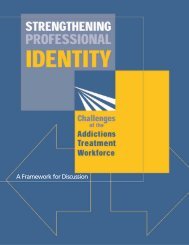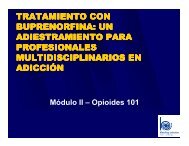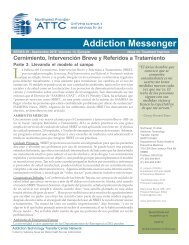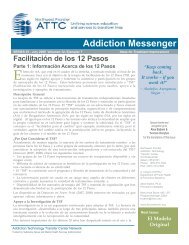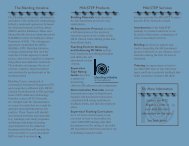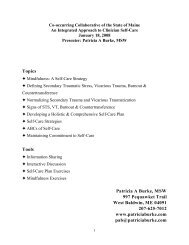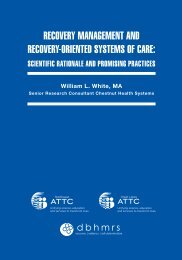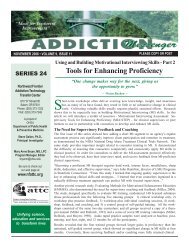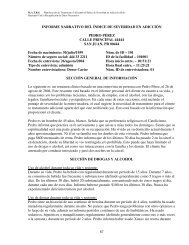alcohol and other drug problems among addiction professionals
alcohol and other drug problems among addiction professionals
alcohol and other drug problems among addiction professionals
Create successful ePaper yourself
Turn your PDF publications into a flip-book with our unique Google optimized e-Paper software.
nEmployer ExpectationsParticipants made it clear that employers are responsible for setting appropriate<strong>and</strong> realistic expectations in this area <strong>and</strong> articulating these expectations clearlyin policies <strong>and</strong> in job interviews. Expectations cannot be presented for the first timeafter the employee has accepted the job, or after the expectations have been violated.The employee’s responsibility is to take all these expectations under seriousconsideration in deciding whether or not to accept the job <strong>and</strong> to live up to all st<strong>and</strong>ardsset forth for the job that he or she has accepted.The organization’s policy <strong>and</strong> procedure manuals must include an outline ofeach position, including all requirements, qualifications, <strong>and</strong> expectations. Thesemust be packaged in text that meets all the tests required, including those imposedby regulatory, statutory, <strong>and</strong> internal policies. Each job description shouldclearly describe the functions associated with the position, the responsibilities ofthe position, <strong>and</strong> the general codes of conduct that apply during working hours<strong>and</strong> non-working hours. One key is a focus on fitness for duty <strong>and</strong> the mental, emotional,<strong>and</strong> AOD-related requirements that are necessary to ensure that an <strong>addiction</strong>professional is fit for duty.To some extent, science-based practices can provide a framework for the developmentof effective clinical skills, <strong>and</strong> so serve as a form of support for healthyprofessional practice. Wherever possible <strong>and</strong> appropriate, employers should set theclear expectation that treatment processes will follow science-based best practice,use proven approaches, <strong>and</strong> be effectively supervised. However, employers shouldalso allow sufficient freedom for the use of the individual clinician’s judgment <strong>and</strong>the development of an individual therapy style.Some participants identified a tendency <strong>among</strong> some organizations to set unrealisticrules <strong>and</strong> expectations, up to <strong>and</strong> including harsh <strong>and</strong> punitive st<strong>and</strong>ards,<strong>and</strong> then to bend these rules. If the policy is unworkable or poorly written, theorganization may tend to “operate by exception,” thus turning exception into defacto policy. Instead, employment expectations must be realistic <strong>and</strong> fair. They mustmatch the level of the job (e.g., management vs. staff ), the professional experience<strong>and</strong> education of the employee, the duties required, <strong>and</strong> the employee’s capacityto inflict harm during the course of work. In addition, expectations must be appliedconsistently <strong>and</strong> uniformly.Participants noted the need for caution that these expectations not arise out ofstigma, stereotypes, or unrealistic notions of what an <strong>addiction</strong> professional should be.They acknowledged the level of stigma within the larger societal culture <strong>and</strong> the powerof that culture in influencing employers’ subjective judgment. They also affirmed thefield’s responsibility to counter stigma within the larger culture, for the sake of organizationalhealth <strong>and</strong> the general well being of clients <strong>and</strong> people in recovery.n 35 n



